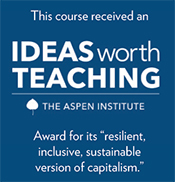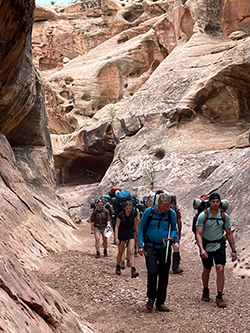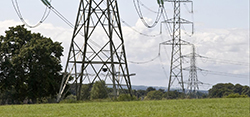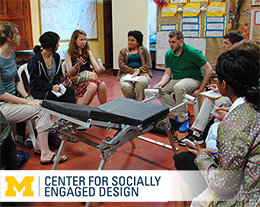Impact Courses You Won’t Want to Miss in Winter 2024
Below is our special listing of highlighted impact courses being offered in Winter 2024. For a complete listing of all impact courses available to students in Winter 2024, please look at our Impact Gateway Course listing, where you will find over 500 impact courses!
BUSINESS
FOR GRADUATE STUDENTS
+Impact Studio Course (BA 670)
Professors: Cat Johnson, Jerry Davis | Credits: 3
Winter 2024

The +Impact Studio graduate course BA670 prepares students to be architects of an equitable, just, and sustainable future. In Winter ’24, this award-winning course will focus on the green energy transition. We will be engaging with neighborhood partners in Detroit to design equitable and feasible business models for innovative green energy models that support communities. The course is 3 credits, and will be offered to all graduate students on Wednesday mornings during Winter semester. This course received an Aspen Business & Society Ideas Worth Teaching Award in recognition of its expansive purpose, innovative thinking, and integrated, multi-disciplinary approach.
FOR GRADUATE STUDENTS
LBLE – Living Business Leadership Experience (BA 655)
Professor: Mike Barger | Credits: 3
Winter 2024
FOR UNDERGRADUATE STUDENTS
LBLE – Living Business Leadership Experience (BA 455)
Professor: Mike Barger | Credits: 3
Winter 2024
.jpg) Living Business Leadership Experience (LBLE) is a 3.0 credit-hour Ross elective course where graduate and upper-level undergraduate students from across the University collaborate to shape, implement, and lead high-impact business initiatives alongside company founders and senior leaders. Whether you’re interested in learning business by doing business, working in a cross-functional team, or navigating complex and ambiguous business environments, this course will give you the chance to develop your leadership skills and dive headfirst into the challenges of business.
Living Business Leadership Experience (LBLE) is a 3.0 credit-hour Ross elective course where graduate and upper-level undergraduate students from across the University collaborate to shape, implement, and lead high-impact business initiatives alongside company founders and senior leaders. Whether you’re interested in learning business by doing business, working in a cross-functional team, or navigating complex and ambiguous business environments, this course will give you the chance to develop your leadership skills and dive headfirst into the challenges of business.
Learn How to Join. To learn more about upcoming Winter 2024 enrollment, email rossactionlearning@umich.edu.
FOR UNDERGRADUATE & MM STUDENTS
Social and Environmental Responsibility and Marketing (MKT 470)
Professor: Burcu Tasoluk
Credits: 3 | Winter 2024
![]() This course will cover interactions between society and marketing and marketing’s role and responsibility (in both environmental and social issues) in society. We will take a triple bottom line (People, Planet, Profit) perspective when evaluating these interactions. As such, the impact of social and environmental concerns on marketing actions, consumer behavior and company performance will be discussed in detail. Diverse perspectives from business ethics, strategy, economics, psychology, and sociology will help students adopt different lenses while analyzing a complex array of contemporary marketing issues. We will be using case studies throughout the course and students will have the opportunity to work collaboratively with peers and to discuss a broad set of interesting topics. Course topics will include Social Sustainability, Environmental Sustainability, Consumer Attitudes toward Sustainable Marketing, Social Influences on Responsible Consumer Behavior, Corporate Social & Environmental Initiatives, Marketing & AI, Brand Activism, and Brand Purpose.
This course will cover interactions between society and marketing and marketing’s role and responsibility (in both environmental and social issues) in society. We will take a triple bottom line (People, Planet, Profit) perspective when evaluating these interactions. As such, the impact of social and environmental concerns on marketing actions, consumer behavior and company performance will be discussed in detail. Diverse perspectives from business ethics, strategy, economics, psychology, and sociology will help students adopt different lenses while analyzing a complex array of contemporary marketing issues. We will be using case studies throughout the course and students will have the opportunity to work collaboratively with peers and to discuss a broad set of interesting topics. Course topics will include Social Sustainability, Environmental Sustainability, Consumer Attitudes toward Sustainable Marketing, Social Influences on Responsible Consumer Behavior, Corporate Social & Environmental Initiatives, Marketing & AI, Brand Activism, and Brand Purpose.
FOR UNDERGRADUATE STUDENTS
InterMission – An Action-Learning Expedition (MO 330)
Professor: Kevin Thompson
Credits: 3 | Winter 2024

InterMission is a self leadership course for students adrift in a sea of expectations who are exceptional at fulfilling goals set by others but find themselves too busy to reflect on whether they are the right thing to do. The course includes a one-week wilderness expedition in Utah’s Canyonlands with the National Outdoor Leadership School (NOLS). The wilderness expedition is strenuous and has an incremental cost. InterMission has 10 classroom sessions of 90 minutes each and 7 intensive days on the wilderness expedition, which runs at the conclusion of winter term before summer internships. The classroom sessions will utilize and apply three rigorous, science-based frameworks developed at Harvard Business School, Virginia’s Darden School and Michigan’s Ross School.
SUSTAINABILITY
FOR GRADUATE STUDENTS
Sustainable Operations and Supply Chain Management (TO 560)
 Professor: Ravi Anupindi
Professor: Ravi Anupindi
Credits: 2.25 | Winter 2024(A)
Firms today face increasing pressure from activists, investors, and customers, to reduce the environmental impacts of their operations and supply chains as well as uphold basic human rights and labor standards for the people who produce the materials / components / products. How is responsibility (for ensuring sustainability) apportioned across the extended value chain that includes the end consumers? This course examines how to design and manage environmentally and socially responsible operations and supply chains. This course is actually 2.25 credit hours, although it may be listed as 1.5.
FOR GRADUATE STUDENTS
Systems Thinking for Sustainable Development and Enterprise (STRAT 566)
Professor: TBA
Credits: 3 | Winter 2024

Challenges to a sustainable human future such as climate change, population growth, biodiversity loss and persistent poverty are characterized by extraordinary detail and dynamic complexity. This course fosters the skills of systems thinking and systems dynamics modeling necessary for understanding global environmental and social change. This holistic and dynamic understanding is employed to chart pathways for sustainable human development and business.
POLICY AND LAW
FOR GRADUATE STUDENTS
Human Trafficking Lab (Problem Solving Initiative),
(LAW 741.001)
Professors: Elizabeth Campbell (Law), Courtney Petersen (Law), Chavi Nana (Law)
Credits: 3 | Winter 2024
The Human Trafficking Lab is a social justice innovation space where multidisciplinary student teams use design thinking to research, incubate, and build replicable, scalable, and disruptive solutions to reduce vulnerability to trafficking.
The Lab takes an expansive approach to addressing vulnerability. As such, projects cover a wide range of topics, and they vary each semester. Some examples of topics might be helping job seekers expunge their criminal records when they apply for a job, combating misinformation in anti-trafficking narratives, and addressing forced labor in supply chains. Geared towards creating systems level change at policy, service, and industry levels through collaborative partnerships across the nonprofit, corporate, and governmental sectors.
FOR GRADUATE STUDENTS
Roadmap to Clean and Equitable Power in Michigan (Problem Solving Initiative), (LAW 741.002)
Professors: Andrew Buchsbaum (Law), Mike Shriberg (SEAS)
Credits: 3 | Winter 2024
 Extreme heat. Severe storms. These climate change impacts are accelerating a spiraling crisis: driving higher power demand while degrading reliability and increasing costs, especially for underserved communities. At our current tipping point moment, this multidisciplinary problem-solving course will analyze alternatives to investor-owned electric utilities in Michigan, creating a roadmap to solutions ranging from adjusting incentives to a full public takeover. Students from across campus will apply to partner with climate and energy justice advocates to publish and present their findings.
Extreme heat. Severe storms. These climate change impacts are accelerating a spiraling crisis: driving higher power demand while degrading reliability and increasing costs, especially for underserved communities. At our current tipping point moment, this multidisciplinary problem-solving course will analyze alternatives to investor-owned electric utilities in Michigan, creating a roadmap to solutions ranging from adjusting incentives to a full public takeover. Students from across campus will apply to partner with climate and energy justice advocates to publish and present their findings.
ENGINEERING AND ENTREPRENEURSHIP
FOR UNDERGRADUATE & GRADUATE STUDENTS
Socially Engaged Engineering & Design (SEED) Capstone (ENG 490.33530)
Professors: Charlie Michaels, Erin Moore
Credits: 3 | Winter 2024
 The Center for Socially Engaged Design (C-SED) is excited to announce the new Socially Engaged Engineering & Design (SEED) Capstone course for the 2024 Winter semester. This 3-credit, elective course will provide students the opportunity to explore complex challenges, engage with real stakeholders, and design people-first solutions.
The Center for Socially Engaged Design (C-SED) is excited to announce the new Socially Engaged Engineering & Design (SEED) Capstone course for the 2024 Winter semester. This 3-credit, elective course will provide students the opportunity to explore complex challenges, engage with real stakeholders, and design people-first solutions.
In the course, you will engage with stakeholders, perform primary and secondary research on contextual factors, learn and practice interviewing skills, present a solution idea and summary of your process and possibly continue your work in a funded Summer Fellowship program! How does it work? The SEED class will be hosted in a hybrid format, is group-project-based and requires significant independent teamwork outside of course hours. You will work on a team in this course. Project topics will be provided; there will also be an opportunity to propose your own team-based project as part of this course.
Are you interested in joining the SEED Capstone course? To get course registration notifications and more information, please complete this brief interest form.


.jpg)